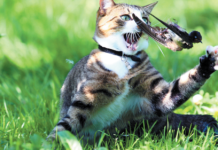Perhaps you would feel more comfortable feeding your cat a diet you cooked up yourself rather than one you bought at the store. But you want to make sure that the diet you are making is actually healthful for her. So you don’t simply check the Internet for online recipes; the bulk of them are nutritionally inadequate and unbalanced, according to a recent study in the Journal of the American Veterinary Medical Association. Instead, you work with a board-certified veterinary nutritionist who has the necessary knowledge to develop a diet appropriate for your cat’s age and health status.
You’re all set, right? Not necessarily. Several years ago, the veterinarians who run the nutrition clinic at the Cummings School of Veterinary Medicine at Tufts University surveyed pet owners who had started feeding their pets homemade diets devised by the school’s Clinical Nutrition Service. Their finding: the rate of strict adherence to the recipes was only 13 percent, which meant that only one in every seven pets was being fed by an owner who had followed the directions to the letter. The rest of the pets were being put at nutritional risk.
The reasons for the “dietary drift,” as the Tufts researchers called it, included everything from lack of adherence to prescribed portion sizes to changes in dietary fats and omissions of vitamin/mineral supplements needed to make the meals nutritionally adequate. Sometimes owners made ingredient substitutions that completely changed the food’s nutrient profile. In a number of cases, owners stopped feeding their pets the homemade diet altogether even though they had gone through the trouble and expense of having one developed by a veterinary nutritionist. They cited the time and effort involved; the pet’s dislike of the diet; and their own sensory response during food preparation, namely, not liking the odor of the meals they were preparing.
The results of the survey, published in the Journal of Small Animal Practice, were about dogs specifically but the takeaway translates. Making your pet’s food rather than buying it is no simple thing. It can be even harder with cats, particularly if you want to switch their diets after they have matured into adults. “Because cats develop such fixed texture preferences early on in life, they tend to be less amenable to home-cooked diets, especially those cats who are used to eating dry food,” says board-certified veterinary nutritionist Cailin Heinze, VMD. Tufts board-certified veterinary nutritionist Lisa Freeman, DVM, echoes the point. While some cats will accept homemade food, “many won’t eat a nutritionally balanced home-cooked diet,” she says.
If you’re determined to give it a go despite the obstacles
If you do want to try making your cat’s food in spite of the difficulties, do it for an adult cat only — not one younger than 12 months. Also, don’t prepare a homemade diet for a cat who’s pregnant or nursing — there’s just too much at stake. You want to make sure the developing fetuses have optimal nutrition; there’s less wiggle room for error before a cat reaches maturity. (Keep in mind that homemade diets, unlike cat food made by large companies, are not commonly tested for nutrient content after preparation, nor are they put to the test in standardized feeding trials.)
Additionally, don’t prepare a home-made diet for an overweight cat on a weight-loss regimen. It’s much harder to keep adjusting a homecooked regimen than a commercial diet during the process of weight loss, so it’s much less likely that the diet plan will be successful. Remember, too, that on top of being more time-consuming than just dishing out some kibble from a bag or wet food from a can, preparing a homemade diet is probably going to be more expensive than buying a nutritionally appropriate food, and not just because of the extra money you’ll spend conferring with a board-certified veterinary nutritionist.
The ingredients themselves will often cost more. Finally, you can’t make what seem like reasonable substitutions. For instance, you can’t just cut up some chicken breast meat if the recipe calls for dark meat and you don’t have any in the house — the fat and nutrient content, as well as the calories, will be different. Bottom line: home cooking your cat’s diet is a complicated process, one that is not necessarily better for your cat than commercially prepared food. And some cats just don’t appreciate the extra effort and will refuse to eat it.
- Per pound of weight, cats need two to three times the protein of dogs, cows, or horses.
- Cats need significantly higher amounts of the amino acid arginine in their diet than many other animals. Most animals can synthesize some of it — not cats. And it’s needed to get rid of ammonia — a waste product of protein breakdown.
- Taurine is another amino acid that cats can’t make on their own (while many other animals can). A deficiency in the diet can cause everything from blindness in kittens to heart problems to reproductive problems in adult females.
- Cats need higher amounts of certain B vitamins than other animals and can only make use of certain forms of vitamin A.




